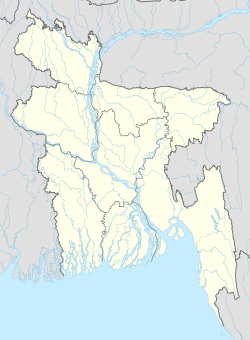Banaripara Upazila
Banaripara
বানারিপাড়া | |
|---|---|
| Coordinates: 22°46.9′N 90°10′E / 22.7817°N 90.167°E | |
| Country | |
| Division | Barisal Division |
| District | Barisal District |
| Area | |
| • Total | 134.32 km2 (51.86 sq mi) |
| Population (1991) | |
| • Total | 143,825 |
| • Density | 1,100/km2 (2,800/sq mi) |
| Time zone | UTC+6 (BST) |
| Website | Official website of the Banaripara Upazila |
This article relies largely or entirely on a single source. (March 2020) |
Banaripara (Template:Lang-bn) is an Upazila of Barisal District in the Division of Barisal in southern-central Bangladesh.[1]
History
During the Liberation War in 1971, the Pakistani army killed many innocent people[citation needed] of village Gava where all Ghosh Dastidar and Ghosh Ray used to live and they mostly left their ancestral land for good.
Geography
Banaripara is located at 22°46′55″N 90°10′00″E / 22.7819°N 90.1667°E. It has 26,697 households and a total area of 134.32 km².[citation needed] It is surrounded by Wazirpur to the north and the east, Nesarabad to the south, Jhalokati to the east, Nazirpur to the west. The upazila is criss-crossed by many rivers. Banaripara pourashava stands on the Shandhya. River erosion is a matter of concern for this area.[citation needed]
Demographics
According to the 1991 Bangladesh census, Banaripara had a population of 143,825. Males constituted 50.67% of the population, and females 49.33%. The population aged 18 or over was 70,724.
Administration
Banaripara was established as a thana[definition needed] in 1913 and in 1983 it was upgraded as an upazila[clarification needed]. It consists of eight unions and one pourashava[when defined as?]. The pourashava has an area of 4.77 km2 and is known as Banaripara sadar. Eight unions are: Syedkathi, Baisari, Iluhar, Bisharkandi, Chakhar, Bankpur, Udaikathi and Banaripara. These are divided into 87 mauzas/mahalla,[clarification needed] and 77 villages.[clarification needed]
Archaeological heritage and relics
There are two Swathidaha Maths, a copper Manasa Bigraga weighing 3.5 maunds and a six-foot-high Bigraha at Narattampur (200 years old) which used to be family lineage of the Ghosh Ray family of Narratampur.
Education
There are three colleges in the upazila. Government Fazlul Huq College, founded in 1940, is the only public one.
There are 27 high schools, 80 government primary schools, 41 non-government primary schools, 59 madrassas, 1 school for the deaf and dumb and 1 commercial school in this upazila.
According to Banglapedia, Baisari High School, founded in 1880, Banaripara Union Institution, (1889), and Nalasree Government Primary School (1910) are notable schools.[1]
Maps
Official Map of the Banaripara Upazila
References
- ^ a b Rahman, Kazi Mizanur (2012). "Banaripara Upazila". In Islam, Sirajul; Jamal, Ahmed A. (eds.). Banglapedia: National Encyclopedia of Bangladesh (Second ed.). Asiatic Society of Bangladesh.


